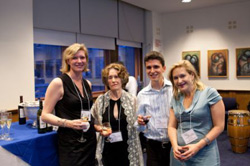Thirty Years of 'Making Something from Nothing'
Thirty Years of ‘Making Something from Nothing’
Not every audience would have caught the irony when Adrian Ellis, the executive director of Jazz at Lincoln Center, deadpanned that non-profit arts organizations “are axiomatically wellsprings of creativity” – or laughed even before he added that “they often are deadeningly uncreative.”
But Ellis, who teaches a course on international cultural policy in TC’s Arts and Administration Program, wasn’t addressing just any audience. His 100-odd listeners, ranging from a development officer at the Guggenheim Museum to the executive director of the Nuyorican Poet’s Cafe, were alumni of TC’s Arts Administration program, gathered for the programs 30th Year Anniversary and Reunion weekend.
Ellis’ keynote address, which focused on how to foster a culture of real entrepreneurship in a cultural sector that is too dependent on charity, set the tenor for a weekend that, in addition to being about schmoozing and catching up, was a forum for graduates to probe questions central to the profession. Such conversations are the hallmark of the highly successful Arts Administration program, reflecting the focus of its founder and guiding spirit, Joan Jeffri, an entrepreneurially-minded former actress who also directs TC’s Research Center for Arts and Culture. Jeffri’s books include ArtsMoney: Raising It, Saving It, Earning It, and Respect for Art: Visual Arts Administration and Management in China and the United States (co-authored with Yu Ding), and her most recent study “Above Ground,” documented the survival skills and social supports of aging artists in New York City.
“Joan, if you didn’t exist, we’d have to find a way to invent you,” TC Deputy Provost John Allegrante told a group gathered at Lincoln Center for a Saturday morning brunch. Allegrante pointed out that out that when Jeffri joined the program thirty years prior, “no one had an idea of what a degree in the field even meant.”
Leah Maddrie, an actor from the Class of 2000 who works as a development officer at the Upper West Side’s Symphony Space, credited the program for helping her to “think about issues in the arts in an aggressive way -- like how to get funding, how to find audiences, the value of the not-for-profit model, the many ways of consuming art and how to keep the arts alive.”
Ellis tackled those issues head-on in his keynote address, surveying the cultural sector’s attempts to create new revenue streams and business models by opening cafes, exploiting tax loopholes, the temporary leasing of museum collections, tapping into venture capital. He faulted arts organizations for tending, in their appeals to philanthropists, to over-emphasize their ability to become financially self-reliant. And he had some advice for philanthropists as well: Don’t get bored by your commitments, don’t force non-profits to be all things to all funders, and, if you really intend to encourage entrepreneurial activity, start funding for-profit models as well. “Most entrepreneurial activity in the arts,” he added, “is clandestine.”
Alumna Ruth Loomis, vice president of the non-profit Opportunity Resources Inc., who came from Los Angeles to attend the reunion, found.Ellis’s comments on the mark. “I’ve seen organizations rush to put in that café, thinking it will draw visitors,” she said “There’s a rush to follow a new business model that doesn’t always work.”
The Saturday morning keynote by Maryland-based choreographer Liz Lerman was as inspiring as Ellis’s was intellectually probing. Lerman had a message for the alumni gathered at Lincoln Center: artists are dependent upon you for their survival. You are the ones, she said, who have to get up every day and take on the utterly challenging task of convincing the outside world of the value of the imagination.
“I’m doing work with physicists smashing particles,” Lerman said. “They talk a lot about making something out of nothing. But no one knows how to make something out of nothing like artists.”
Published Wednesday, Jun. 23, 2010
